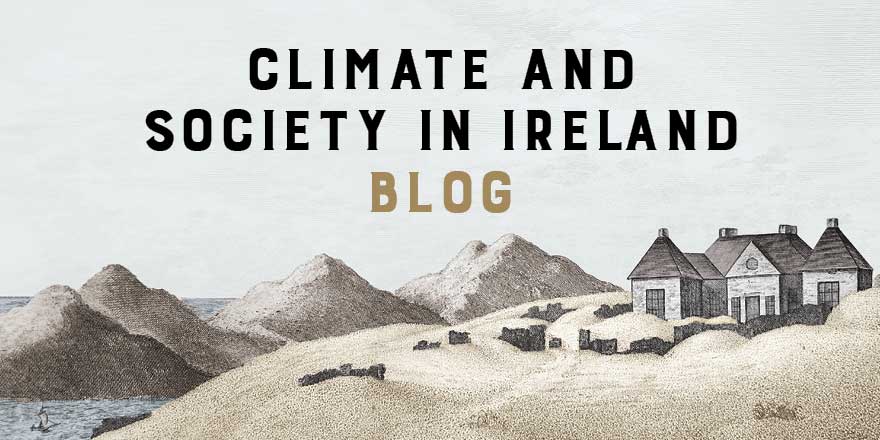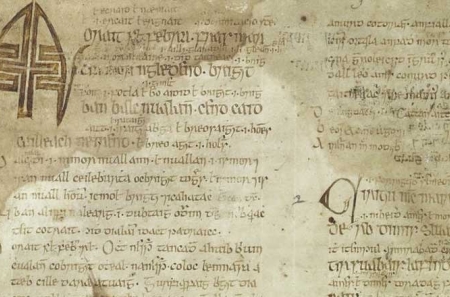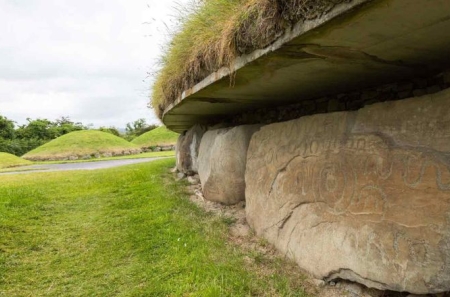
Poetry and climate change in Ireland 1600–1820
03 November 2021In today's blog on Climate and Society in Ireland, Lucy Collins explores what poetry reveals about the evolving relationship between humans and their environment.
Climate and Society in Ireland is a collection of essays, commissioned by the Royal Irish Academy, that provides a multi-period, interdisciplinary perspective on one of the most important challenges currently facing humanity. In Chapter 10, Lucy Collins (UCD) explores the changing representation of weather in poetry written in Ireland between 1600 and 1820 and examines the relationship between literary convention and political and intellectual transformation in these texts.
‘Civilization inevitably runs to its end with a blindfold over its eyes’ wrote Eugène Huzar in 1855, before going on the predict that in ‘one or two hundred years’ the emissions from the world’s railways and steamships, factories and workshops would ‘disturb the harmony of the world’. This prescient awareness of the influence of human action on the wellbeing of the world is testament to the significant evolution of responses to the human relationship with atmospheric events over the preceding centuries. The need to recognise climate change as not only a scientific, but also a cultural, phenomenon means there is much to be discovered from the representation of weather before the systematic development of scientific learning. The changing representation of weather in English-language verse of the seventeenth and eighteenth centuries attests to the impact of the growth in natural philosophy and the early development of science, while the evolving use of natural imagery enriches the way poets investigate and express political dynamics. For poets, Ireland has for centuries constituted a space of detailed observation as well as for elaborate metaphorical meaning. This essay explores what these texts reveal about the evolving relationship between humans and their environment, and how the language of poetry shapes this understanding.
From its inception in the 1990s ecocriticism as a discipline has been concerned with the capacity of literary texts to foster environmental awareness. Foundational texts in British ecocriticism focused on Romantic poetry as a means to explore human consciousness of the natural world and acknowledge the shared vulnerability of all living things. The social and political implications of this analysis were soon evident and shaped the first ecocritical engagements with early modern texts, which challenged previous assumptions of their anthropocentric character. While one would be mistaken, as Todd Borlik has argued, to expect these writings to represent ‘fully formulated theories of biotic egalitarianism’, they nonetheless exhibit a complex awareness of the relationship between human and non-human life. Early work in the discipline returned to canonical texts, reading Shakespeare and Milton through an ecocritical lens and paying particular attention to the political and theological implications of climate imagery. Recent ecological readings of the early modern period have opened the work of less well-known writers to scrutiny, revealing how overlooked texts shed light on everyday experiences of natural phenomena, and inform the relationship between literature and other modes of writing. In this way environmental debates have paved the way for a more inclusive literary canon and a greater depth of political engagement by critics.
In Ireland between the Tudor conquests and the Romantic period, representations of the natural world were shaped, firstly, by the dynamics of the Gaelic Irish, Old English and New English communities, and, secondly, when this triangular nexus was reduced in the seventeenth century to a more straightforward binary rivalry, to that of the Protestant and Catholic interests. The variable relationships this fostered between different linguistic, religious and intellectual traditions is evident in the evolving understanding of climate events and their impact on individual human experience. Nature could no longer be construed as stable and comforting, as ‘a consoling cycle of growth, decay and renewal’. Increased understanding of the links between meteorology and physiology in the early modern period has underlined human embeddedness in the material world and this, in turn, has indicated the challenges to direct representation of extreme weather events. These challenges sometimes resulted in stylistic experimentation, but in other cases yielded a reluctance to engage directly with the extremity of experience. Poetry from mid-seventeenth-century Ireland not only drew on English literary conventions when depicting the natural world but also reflected the particular anxieties provoked by war and its attendant social and political upheaval. A century later, extreme weather was not always described as frightening; storms or floods could serve to intensify the sense that Ireland was a wild and untamed place, and to provide for the reader a frisson of excitement. During the Romantic period, roughly from the 1790s to the 1850s, poetry combined close connection to the landscape with forms of ethical or emotional reflection. It increasingly engaged with the world of empire, and explored relations between Ireland and Britain directly, as well as meditating on larger questions concerning human hierarchy and social order.
To continue reading, purchase Climate and Society in Ireland.



